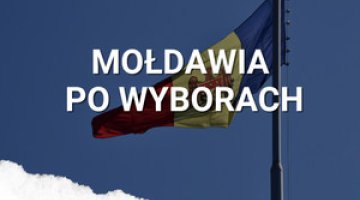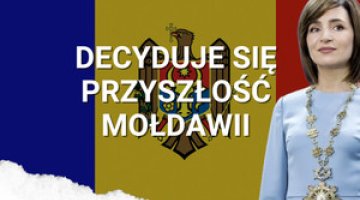A technocrat for tough times? Moldova’s new government
On 31 October, the Moldovan parliament, elected in the September election (see ‘Election in Moldova: PAS wins an outright majority once again’), voted to grant a vote of confidence to the majority government formed by the Party of Action and Solidarity (PAS). The cabinet is headed by 61-year-old Alexandru Munteanu, a Moldovan–American businessman and investor with no prior involvement in politics. The new government received the backing of 55 PAS MPs. Opposition parties – including the pro-Russian Socialists and Communists, as well as the pro-Western but PAS-opposed Democracy at Home (DA) party, which is linked to Romania’s radical nationalist Alliance for the Union of Romanians (AUR) – voted against it.
Appointing an experienced businessman with no political background as prime minister is intended to stimulate the economy and enable the implementation of unpopular reforms without directly burdening the ruling party’s image. The most important of these reforms will concern decentralisation, which is essential in the context of Moldova’s accession negotiations with the EU.
Commentary
- Munteanu’s appointment as prime minister was determined by his economic expertise, managerial skills, and lack of political ambitions or backing. The first two factors are crucial given the need to revitalise an economy that has remained stagnant since Russia’s invasion of Ukraine. In 2022, Moldova’s GDP contracted by 4.6%, while in 2023 and 2024 it grew by only 1.2% and 0.1%, respectively (this year’s growth is projected at a mere 1.2%). His lack of political affiliation is also significant, as Chișinău must, in the coming months, implement a series of unpopular reforms (see below). As a technocrat, Munteanu is expected to bear the reputational cost of difficult decisions and, if necessary, be easily replaced.
- The new government will be compelled to implement numerous difficult reforms required by the EU and stemming from the need to improve the efficiency of the state apparatus. These include raising salaries and increasing employment in public administration, a possible tax rise, and the long-delayed decentralisation reform. Moldova, a country of approximately 2.4 million inhabitants, is currently divided into 32 raions (top-tier administrative units, equivalent to provinces) and roughly 900 municipalities. Such extreme fragmentation not only generates high costs but also leaves many local administrative units underfunded and ineffective, with some municipalities numbering only a few hundred residents. The current administrative structure also hinders the effective absorption and use of EU funds, on which Chișinău is relying in the near future. However, plans to reduce the number of raions and municipalities face strong resistance from a significant part of the population.
- The new government’s priority will be to complete EU accession negotiations by 2028. For this reason, key figures involved in the process have retained their positions: Foreign Minister Mihai Popșoi and Minister for European Integration Cristina Gherasimov, both of whom also serve as deputy prime ministers. A new post of Presidential Special Envoy for European and Strategic Partnerships has also been created, and on 31 October former foreign minister Nicu Popescu was appointed to this post. The main challenge in the accession talks will be the opening of the first negotiation cluster (the so-called fundamentals). For now, this remains blocked due to Hungary’s position, as Budapest is obstructing the start of negotiations with Ukraine. Since the accession processes of both countries are interconnected, they require synchronised and analogous decisions.
APPENDIX
Alexandru Munteanu (born in 1964 in Chișinău) – a physicist, financier, and investment manager with international experience, previously unaffiliated with any political party. After graduating, he worked at the Institute of Applied Physics of the Moldovan Academy of Sciences and lectured at the Technical University of Moldova in Chișinău. Following the country’s independence, he joined the National Bank of Moldova. He later pursued postgraduate studies at Columbia University in New York, specialising in international relations, banking, and finance. Upon completing them, he began working at the World Bank in Washington, D.C. In 1997, Munteanu returned to Moldova and became deputy director of the Centre for Strategic Studies and Reforms (CISR). He later served as director of the Moldovan office of the Western NIS Enterprise Fund (WNISEF), a US investment fund, and sat on or chaired the supervisory boards of several companies in Moldova and Ukraine. In 2007, he settled in Kyiv, where he headed the Direct Investment Department at Dragon Capital (Ukraine) until 2016. That year, he founded 4i Capital Partners, an investment company operating in Eastern Europe. He co-founded the US Chamber of Commerce in Moldova and the Moldovan branch of the Alliance Française, for which he was awarded the title of Chevalier of the Legion of Honour by the French Republic in 2006. He holds Moldovan, US, and Romanian citizenship. He returned permanently to Moldova in 2025.





